 |
| |
e-newsletter of the Centre for Environment Education |
|
|
 |
| July 1-31, 2016 |
|
 |
|
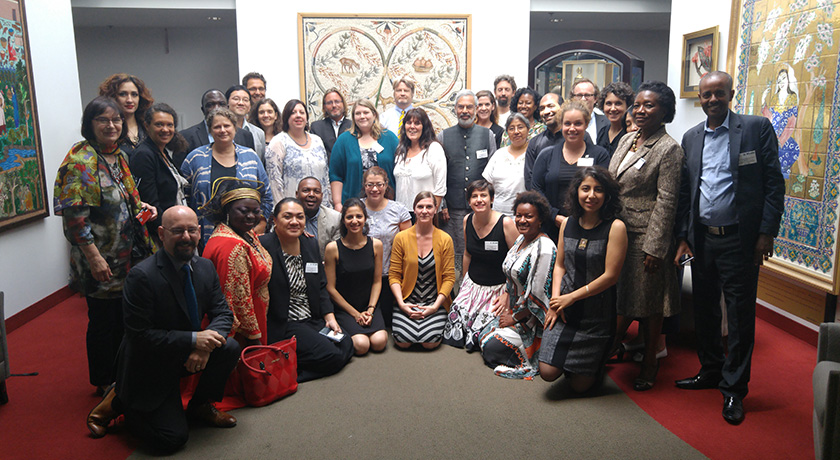 |
| During the Informal meet of the CBD group in Montreal, Canada |
 |
CEPA-IAC Meeting and Messaging Workshop for CBD in Montreal, Canada |
|
A meeting of the Informal Advisory Committee on Communication, Education and Public Awareness (CEPA-IAC) and the Messaging Workshop for Convention on Biological Diversity (CBD) was held from July 19-28, 2016 in Montreal, Canada. CEPA-IAC provides advice on the implementation of the programme of work on communication, education and public awareness.
Kartikeya V. Sarabhai, Director, CEE, as a representative on CEPA-IAC which consists of representatives from both governments and international NGOs, shared CEE’s experiences in designing innovative Biodiversity Education programmes. He presented the concept of Handprint: Positive Actions towards Sustainability. The linkages between the SDGs and the Strategic Plan for Biodiversity, and the configuration of actions and actors for a communications strategy were discussed in the workshop. The meeting was attended by experts from Antigua and Barbuda, Belgium, Canada, Cameroon, Colombia, Ethiopia, India, Kyrgyzstan, Tanzania, Tonga and Uganda.
Implementations of the programme of work devised in this meeting will be affirmed during the COP 13 to be held in Cancun, Mexico, on December 4-17, 2016.
To know more about CEE’s work under Education for the Conservation of Biological Diversity please visit: www.educationcbd.org
|
|
|
 |
|
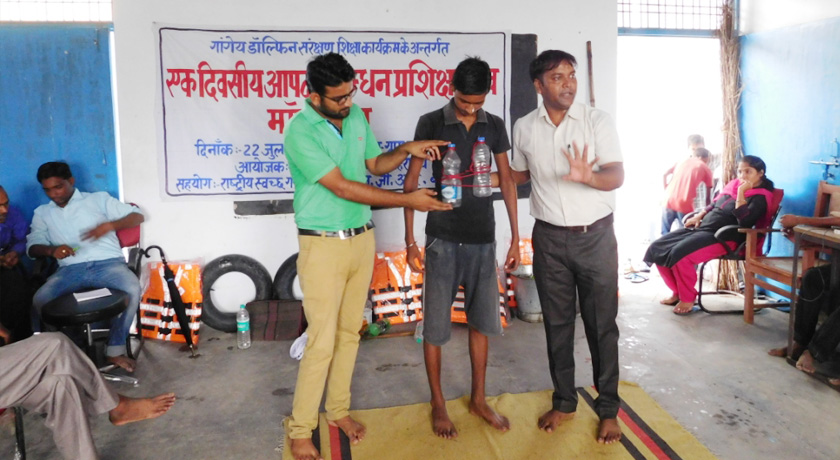 |
|
| Training on flood preparedness and response as a part of Ganges River Dolphin Conservation Education Programme |
 |
Disaster Relief and Reduction Training in Bahraich, UP |
CEE North organised a Disaster Relief and Reduction (DRR) training and a mock drill to build capacities of communities to cope with floods and minimise the risk, impact and losses, in Baundi cluster, Bahraich District of Uttar Pradesh on July 22, 2016, under the Dolphin Conservation Education Programme. Participants were trained in Search and Rescue (SAR), use of local resources in flood response, emergency evacuation and basic emergency medical response. Mr. Mohd. Saquib Khan, Project Officer, trained youth on flood preparedness and response through a community led disaster management plan (CDMP). Mr. Vidya Bhooshan Singh, Project Officer, spoke about environmental measures to reduce the impact of floods, the importance of plantation as bio-shields and protection of the habitat of Ganges River Dolphins. Mr. Vipin Verma, Project Associate, was a part of the team. About 60 youth from five Panchayats participated in the training.
CEE North, with support from National Mission for Clean Ganga (NMCG) is implementing the Ganges River Dolphin Conservation Education Programme in 20 districts of Uttar Pradesh and Bihar for conservation awareness and action for Ganges River Dolphin through schools and communities.
|
 |
|
|
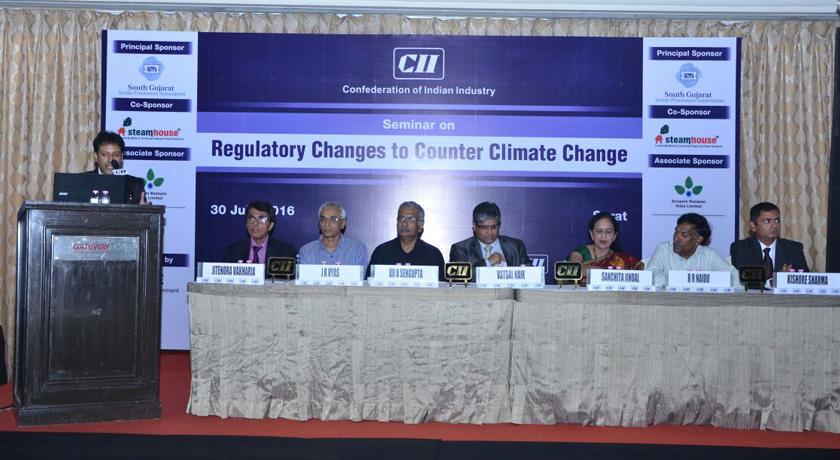 |
| Panelists at the technical session on Solid and Hazardous Waste Management at the seminar |
 |
Seminar on Regulatory Changes to Counter Climate Change |
CEE's Industrial Pollution Prevention (IPP) group, along with the Confederation of Indian Industry (CII), Southern Gujarat, organised a seminar on the regulatory changes to counter Climate Change with a special emphasis on Solid and Hazardous Waste Management, at the Gateway Hotel, Surat, Gujarat on July 30, 2016.
Ms. Sanchita Jindal, Director; Dr. B Sengupta, Former MS, Central Pollution Control Board (CPCB) & Member, Expert Appraisal Committee - EAC (Industry) from the Ministry of Environment, Forest & Climate Change, Government of India; Mr. B R Naidu, Zonal Officer, CPCB; Mr. Jitendra Vakharia, President, South Gujarat Textile Processors Associations (SGTPA); Mr. Vatsal Nayak, Chairman, CII, Southern Gujarat Zonal Council; and Mr. J K Vyas, Head, IPP -CEE addressed the gathering.
Mr. Vatsal Nayak, Chairman delivered the welcome note and introductory remarks, which was followed by the technical sessions chaired by Mr. Chetan C. Contractor, CMD, Detox Corporation Pvt. Ltd.
The seminar concluded with an agreement that waste generating units should follow the principles of waste management hierarchy diligently. It was realised that the Thermal Substitution Rate (TSR) should reach a minimum of 10% in the next three years and all Common Effluent Treatment Plant (CETP) and Treatment, Storage & Disposal Facilities (TSDF) operators should provide pre-processing facilities to increase the co-processing rate. More than 150 participants from individual industries, industrial associations, common environment infrastructure facility operators, and faculties of technical institutes took part in this seminar.
|
 |
|
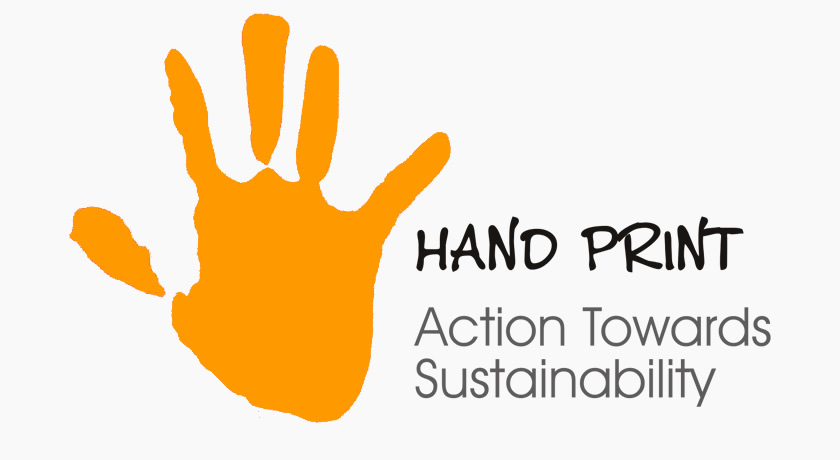 |
|
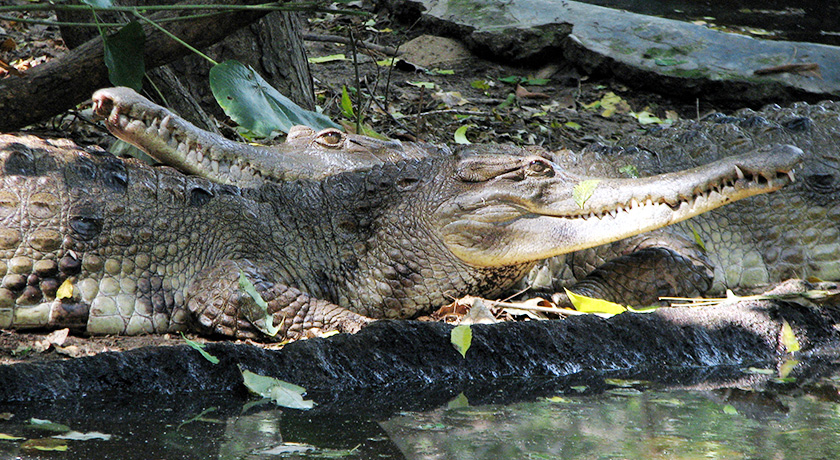 |
| African slender snouted crocodiles in their enclosure at Sundarvan, Ahmedabad |
 |
|
African Slender-snouted Crocodiles for Sundarvan |
Two African slender-snouted crocodiles (Mecistops cataphractus) were brought to Sundarvan, CEE’s Nature Discovery Centre in Ahmedabad, from Madras Crocodile Bank Trust (MCBT), Chennai on August 4, 2016. Air India, India’s flight carrier, provided complimentary transportation for the crocodiles. An international flight with a special pressurised cargo chamber flew the live cargo to Ahmedabad. Specially made wooden boxes, ensuring the safety of the crocodiles and people were used for moving the crocodiles. Mr. Soham Mukherjee, a wildlife biologist specialising in reptiles, accompanied the crocodiles from Chennai to Ahmedabad and carried out their release process into their new home at Sundarvan.
The crocodiles were opened for public viewing on August 23, 2016. Activities such as talk show on crocodiles and ‘selfie’ with a life-like crocodile were arranged on this occasion. The African slender-snouted crocodile is listed under the Critically Endangered category of the IUCN (International Union for Conservation of Nature) Red List of Threatened Species.
The crocodile enclosure along with a room for interpretation facility at Sundarvan was renovated by Nishant Construction, Ahmedabad. |
|
 |
|
|
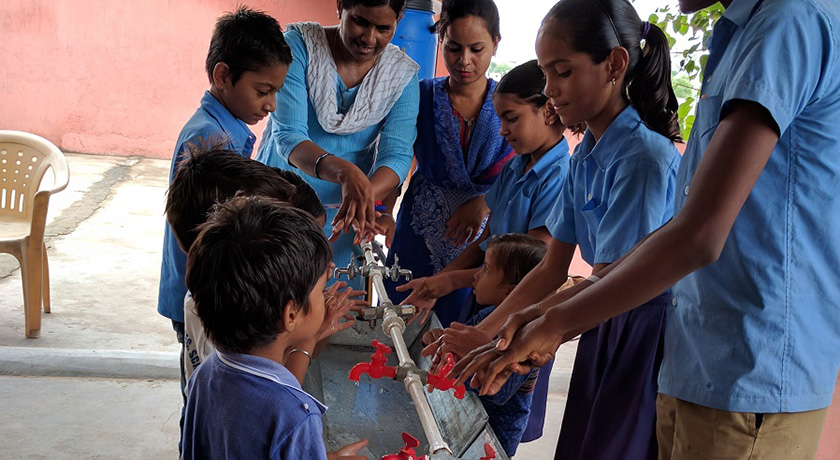 |
| Demostration of handwashing unit for students |
 |
Water, Sanitation and Hygiene Education Programme at Jaipur |
Visits to 44 government schools of Jaipur, Rajasthan were organised as part of the Water, Sanitation and Hygiene (WASH) Education programme for highlighting the importance of handwashing. The visits included a demonstration session of the portable handwashing unit developed by CEE, a discussion with the school management and sharing of other ideas on handwashing facilities. The session ended with feedback from the student WASH council and teachers. A poster, depicting the five steps of handwashing, was distributed to the schools to strengthen the practice.
CEE, along with Akshayapatra Foundation, is implementing the Water, Sanitation and Hygiene (WASH) Education programme in the schools of Jaipur. The programme focuses on internalising personal hygiene and handwashing habits among students.
|
|
|
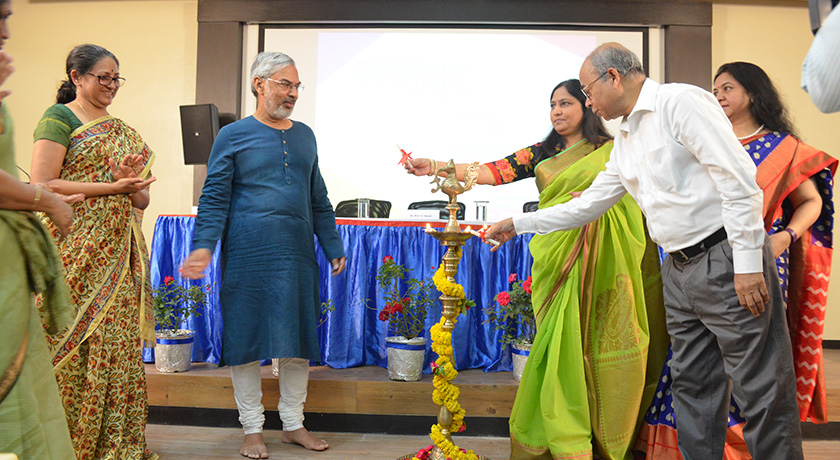 |
| At the inaugural ceremony of the ‘Swachhagraha’-an Adani Act initiative in association with CEE |
 |
‘Swachhagraha’– Creating a Culture of Cleanliness |
‘Swachhagraha’ – an Adani Act initiative in association with the Centre for Environment Education (CEE) towards ‘Creating a Culture of Cleanliness’ - was launched in Ahmedabad on July 22, 2016 at Adani Vidya Mandir. The programme aims to reach out to 250 schools across six cities of Ahmedabad, Surat, Vadodara, Anand, Rajkot and Bhuj-Mundra in Gujarat. Twenty seven city-based schools participated in the launch. ‘Swachhagraha’ will eventually be open to all schools. The Swachhata module to be developed for this initiative will focus on Standards VI to IX but all classes could be involved in the programme.
Dignitaries present on the occasion included Dr. Priti G. Adani, Chairperson; Smt. Shilin R. Adani, Trustee; Mr. P. N. Roy Chowdhury, Executive Director of Adani Foundation; Mr. Navneet Mehta, District Education Officer, Ahmedabad; and Mr. Kartikeya V. Sarabhai, Director, CEE.
After unveiling the formal posters of ‘Swachhagraha’, Dr. Priti G. Adani addressed the gathering and said that the impact of ‘Swachhagraha’ will be seen when cleanliness turns into a habit and it becomes sustainable.
Mr. Navneet Mehta, District Education Officer, Ahmedabad added that where there is discipline, there is everything. “Cleanliness is liked by one and all, and it is time we observed our own behaviour and took necessary action. We must aim at making ‘Swachhata’ integral to our character”.
Mr. Kartikeya V. Sarabhai, Director, CEE, on the occasion said that Swachhagraha is about promoting civic consciousness amongst the citizens through youth leaders. “Being clean is integral to us. We should not tolerate dirt and litter. It is important to join in the Agraha (insistence or strong request) to create a culture of cleanliness. When students learn something, they influence their parents”. He further added, “Swachhata is linked to better health, which further leads to the economic growth of a nation.”
‘Swachhagraha’ draws inspiration from the ‘Satyagraha’ (insistence on truth) - a policy advocated by Mahatma Gandhi – and aims to engage people and bring about a change for ‘Creating a Culture of Cleanliness’. Swachhagraha, it is hoped, will eventually be scaled up to over 12 states across the country.
|
|
|
|
|
|
 |
|
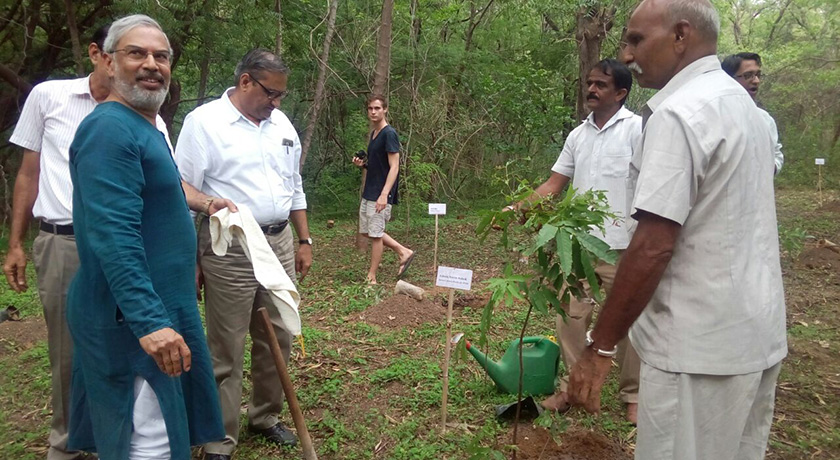 |
| Kartikeya V. Sarabhai, Founder and Director, CEE after planting a sapling |
 |
Vana Mahotsava celebrated at Nehru Foundation for Development (NFD) |
VIKSAT organised Vana Mahotsava on July 22, 2016 at the NFD campus, Ahmedabad. 45 saplings were planted by the staff members of NFD, Vikram Sarabhai Centre for Development Interaction (VIKSAT) and Centre for Environment Education (CEE). Eleven new species of trees were added to the hundred varieties already growing on the NFD campus. Along with this, 38 species were planted at CEE South campus. Kartikeya V. Sarabhai, Director, CEE and Managing Trustee, NFD, initiated the event by planting the Ashok/Seeta Ashok [Saraca asoca] sapling.
Speaking on the occasion, Kartikeya V. Sarabhai said that the initial awareness towards greening focused on tree plantation but presently it has gone a step further, by taking care of trees and nurturing them till they mature. The campus celebrates a huge diversity of trees. We are now going into the next phase by recognising the importance of trees, their position in our ecology, and the insects, birds and animals they attract.
Bharat Pathak, Director, VIKSAT, said that the institution is committed towards biodiversity conservation, and aims to achieve this by enriching the collection of species of trees on campus.
|
|
 |
|
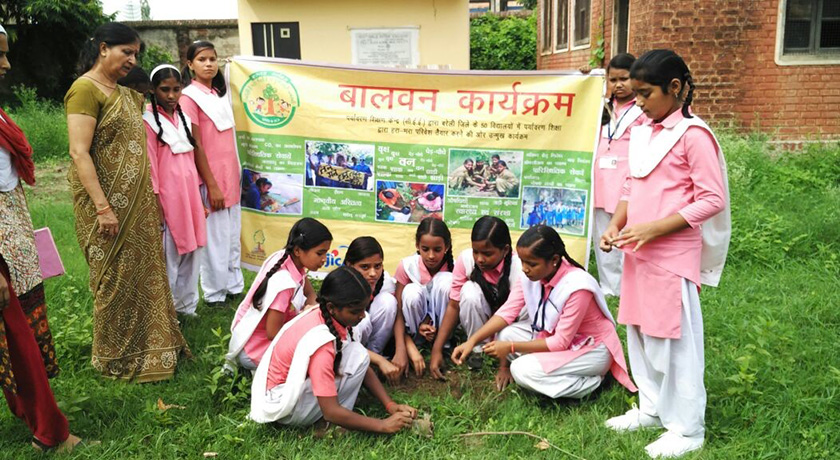 |
| Plantation activity in progress at one of the CFP schools
|
 |
|
Children’s Forest Programme (CFP) Activities |
Plantation Campaign on World Population Day
On the occasion of the World Population Day on July 11, 2016, a plantation campaign was initiated in Uttar Pradesh, where five crores saplings were planted. Shri Akhilesh Yadav, Chief Minister of Uttar Pradesh, inaugurated the campaign by planting a sapling in his house. CEE North and the schools which are a part of the Children’s Forest Programme (CFP) were invited by the State Forest Department to the campaign in Lucknow and Bareilly districts. Students and teachers planted saplings with great motivation. Over 80 species of plants were selected and planted in different districts of Uttar Pradesh.
Activities in Bareilly
CEE’s Bareilly Project Office executed a second round of plantation that took place in 50 Children’s Forest Programme (CFP) schools during July 18-29, 2016 in Bareilly, Uttar Pradesh. Community members, key officials from the State Forest Department and State Education Department were invited. CFP Action Team was given an orientation on the technique of plantation and care of saplings. Community members actively participated in the plantation event in the schools and at community places. About 5000 saplings were planted in 50 CFP schools and 769 saplings distributed to students and local communities. Students were motivated to keep their campuses clean and green.
Earlier, in the first round of plantation, a total of 5800 saplings were planted in CFP schools, the survival rate of which was about 70 percent. The current round of plantations was based on the analysis of this survival rate. The choice of saplings was based on a list of around 21 species of indigenous varieties suitable for the district soil condition, prepared by CEE and available with the Forest Department nurseries.
The CFP is being implemented as a part of the Japan International Cooperation Agency (JICA) supported UP-Participatory Forest Management and Poverty Alleviation Project (UP-PFMPAP) in 13 districts of the state.
|
|
 |
|
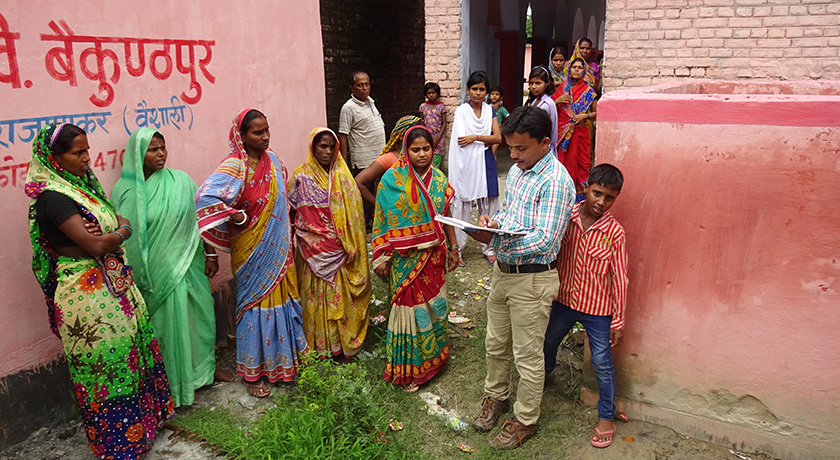 |
| SMC members on the transect walk for revising SDP |
 |
|
Child Friendly Schools and Systems Training |
Under the Child Friendly Schools and Systems (CFSS) project of CEE, 30 trainings were organised in schools in July for School Management Committee (SMC) members, Meena Manch (a forum of school girls introduced by UNICEF to promote their value and rights, which helps to build awareness on issues related to education, health and nutrition, and water and sanitation at the community level), Bal Sansad/Child Parliament (this Government of India programme aims to develop life skills in children, and participation in all activities and management of the school), and teachers. The objective of the training was to orient the SMC members about their roles and responsibilities in the Swachh Vidyalaya Swastha Vidyalaya initiative.
The training sessions broadly covered areas such as the composition of SMC as per the Right to Education guidelines, the key functions of SMC members, the composition and role of a Bal Sansad/Child Parliament and Meena Manch. During each training, a transect walk was organised for the participants to identify gaps in the school campus. After the transect walk, a problem analysis exercise was conducted, based on which, participants revised their School Development Plan (SDP). This SDP became a guiding framework for schools to take up CFSS initiatives.
CEE is implementing a Child Friendly Schools and Systems (CFSS) project with support from UNICEF in 100 schools of Vaishali district, Bihar. Under this, each school undergoes awareness and orientation sessions, followed by a half-day training programme for School Management Committee (SMC) members.
|
 |
CEE is the ENVIS centre on Environmental Education (EE). As an ENVIS centre, CEE caters to the information needs of environmental educators. Write to the CEE ENVIS Centre at [email protected]
|
 |
|
<
 |
This message is sent to you by Centre for Environment Education, Thaltej Tekra, Ahmedabad, India and delivered by [email protected]
© CEE 2016 Editorial: Padma G., Divika Hinger Design: Pankaj Gorana |
|
|
|
|